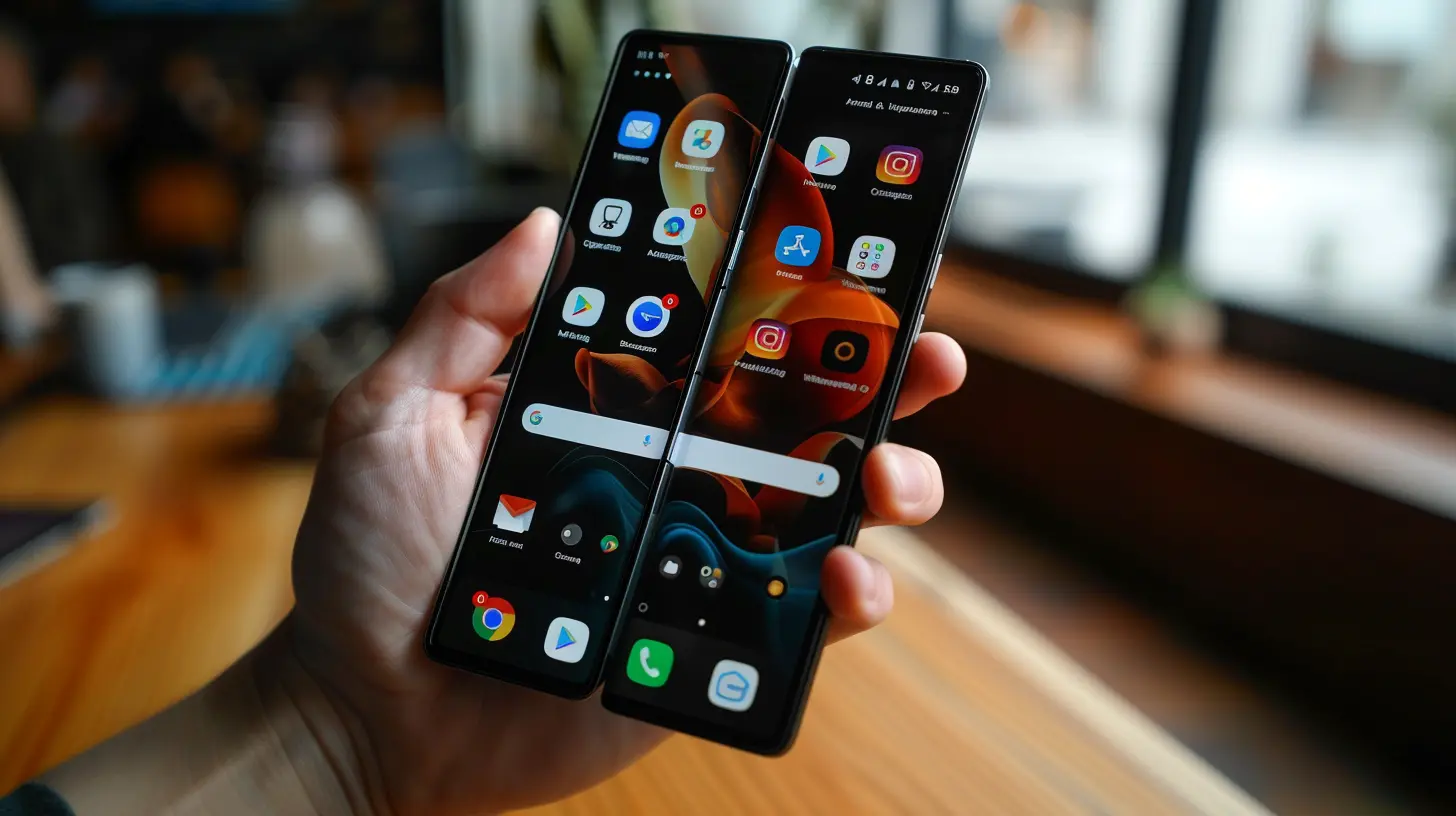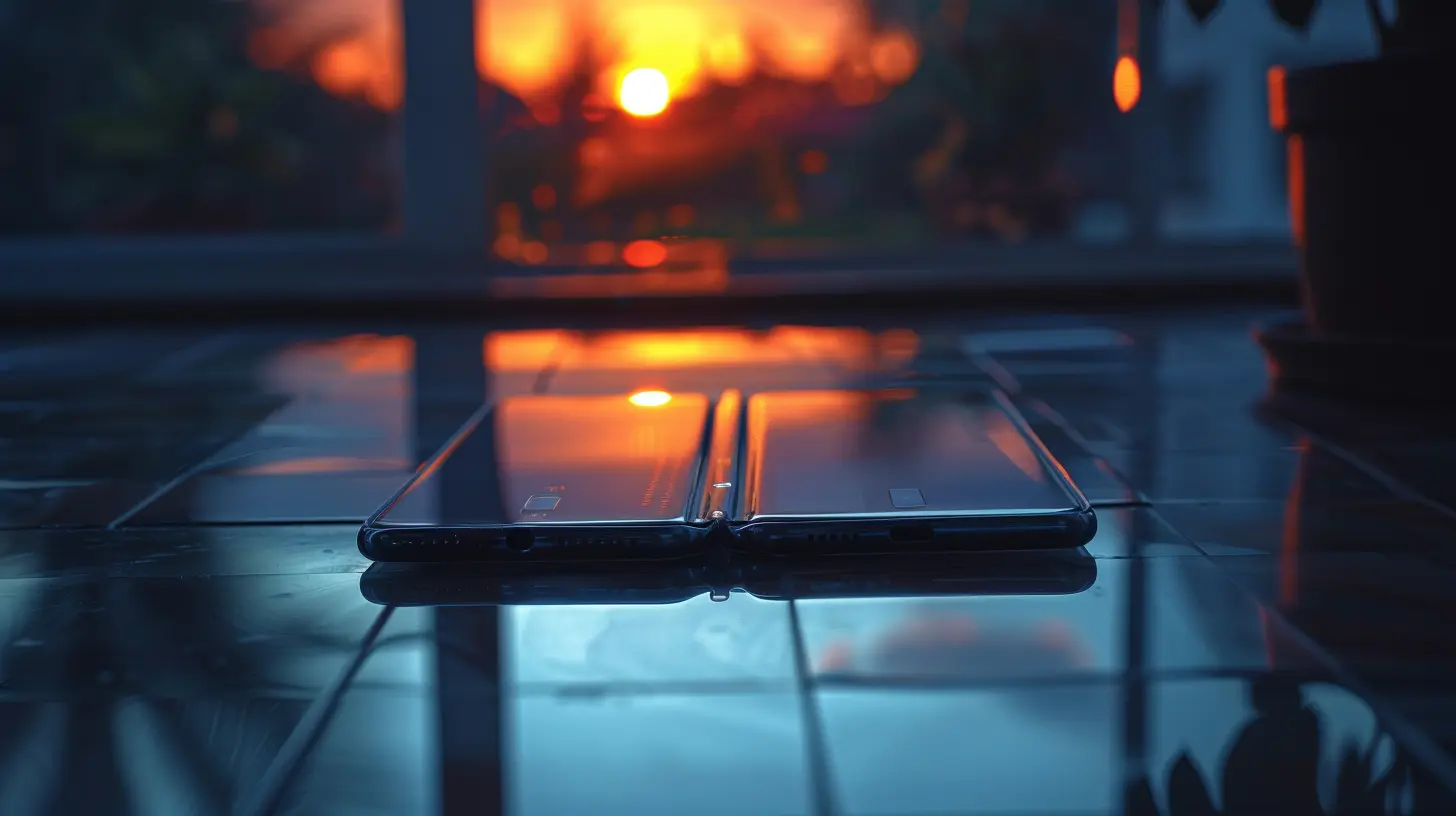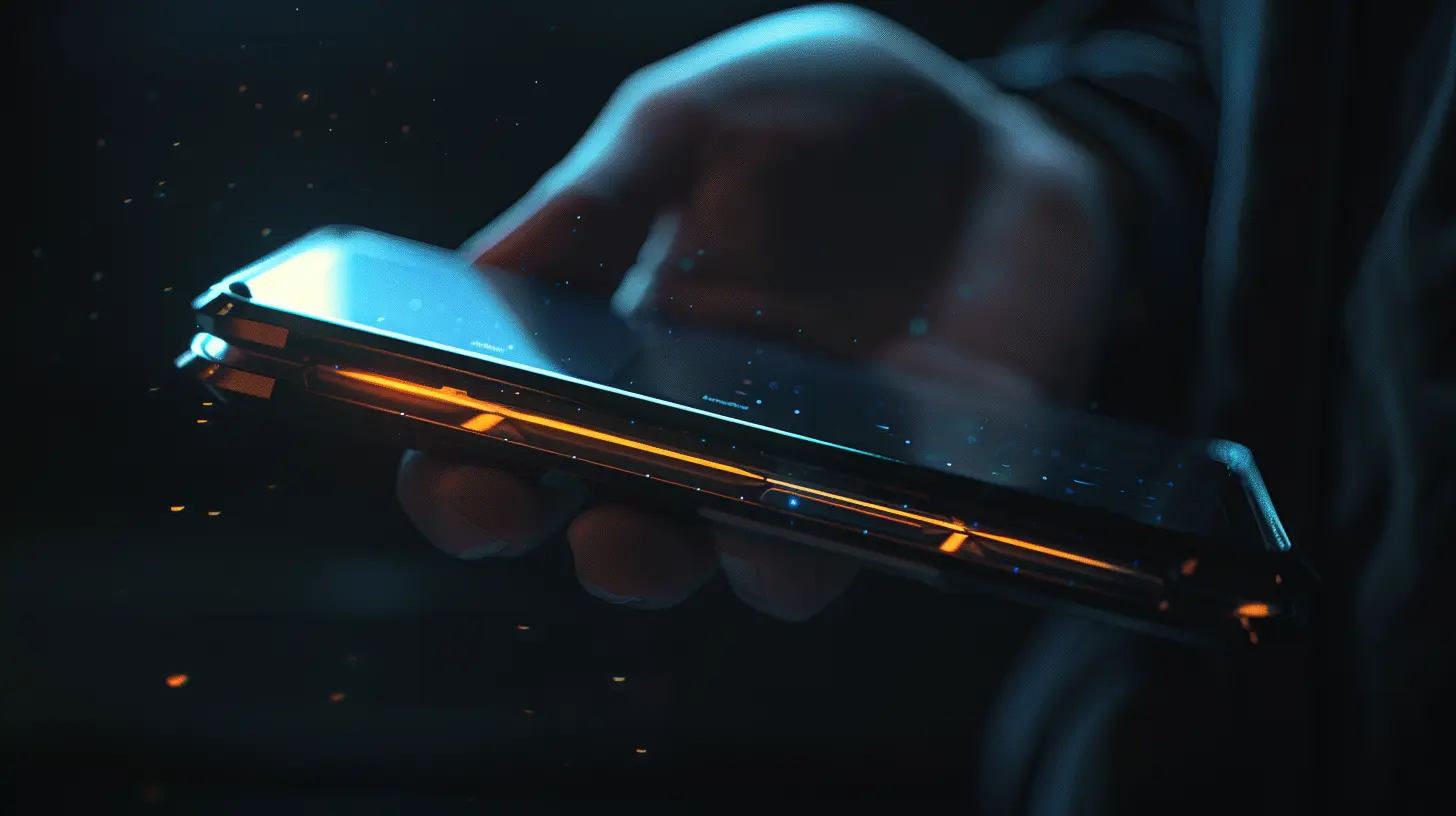Are Foldable Phones the Future? In-Depth Review and Analysis
12 May 2025
Foldable phones—it sounds like something straight out of a sci-fi movie, right? But here we are, living in a world where you can fold your phone like a piece of paper and still have it function just as well (if not better) than your traditional smartphones. You've probably seen them in tech advertisements or maybe even held one in your hand at a store, leaving you wondering, "Are foldable phones really the future?"
In this article, we dive deep into the world of foldable phones. We'll explore their benefits, challenges, and whether they truly have what it takes to become the next big thing in mobile technology. Buckle up, because this might just be the future calling!

What Are Foldable Phones?
Before jumping into the nitty-gritty, let’s clarify what a foldable phone actually is. Foldable phones feature flexible screens, allowing users to fold and unfold the device, transforming it from a regular-sized smartphone into a tablet-like device and vice versa. It’s like having a mini transformer in your pocket.Most foldable phones use OLED (Organic Light Emitting Diode) screens, which are flexible and can bend without breaking. The hinge mechanism in these devices is what allows them to fold, and trust me, a lot of engineering magic goes into getting that part right.
Types of Foldable Phones
Not all foldable phones fold the same way. There are two primary types:1. Horizontal Fold (Book-style): Think of the Samsung Galaxy Z Fold series. You open it like a book, revealing a larger screen inside, like a mini tablet.
2. Vertical Fold (Clamshell): Phones like the Galaxy Z Flip or Motorola Razr fold vertically, like the old-school flip phones from back in the day, but with a modern twist.
Each type has its own unique advantages, and which one is better depends on how you intend to use the device. Some prefer the larger screen of the book-style, while others love the compactness of the clamshell fold.

The Excitement Around Foldable Phones
There’s no denying that foldable phones are cool. They’re the kind of devices that make people stop and ask, “Whoa, what is THAT?” But beyond the initial wow factor, foldable phones are exciting because they offer something that traditional phones simply cannot—versatility.Imagine this: You're watching a movie on your phone, but the screen feels a bit small. With a foldable phone, you can just unfold the device and boom—you’ve got yourself a mini tablet. Need to reply to a message? Fold it back into a more compact form and type away easily. It’s like having multiple devices in one, without actually owning multiple devices.
Multitasking Made Easy
Foldable phones are particularly appealing for multitaskers. With bigger screens, you can run multiple apps side by side, making it easier to juggle between work emails, social media, and your shopping cart on Amazon. Think of it as the ultimate productivity power move.No need to toggle between apps; just spread them out on your screen and handle all your tasks in one go. It's like having your cake and eating it too.
Future-Proof Technology
Let's face it: technology is evolving at breakneck speed. The foldable phone represents the next step in this evolution. In a world where screen real estate is becoming more and more important, foldable phones seem like a logical progression. Besides, who doesn’t want a device that can transform to suit your current needs?
The Challenges Facing Foldable Phones
Before you rush to buy one, let’s talk about the elephant in the room: foldable phones aren’t perfect. While they’ve improved significantly since the early models, they still have some hurdles to overcome.Durability Concerns
One of the biggest concerns with foldable phones is durability. I mean, how many times can you fold a phone before it breaks, right? Early models faced a lot of criticism for screens that would crease, hinges that would wear down, and overall fragility. While manufacturers like Samsung and Huawei have made significant strides in improving durability, it’s still something that gives potential buyers pause.When you’re spending upwards of $1,000 on a phone, the last thing you want is for it to break after a few folds. The good news? Companies are pouring millions into research to make these devices sturdier. But for now, you'll still need to handle them with a little more care than your typical smartphone.
Price Tag
Let’s be real: foldable phones are expensive. Like, really expensive. Most of the high-end models cost well over $1,000, and that’s for the base versions. Sure, you’re getting cutting-edge technology, but not everyone is willing (or able) to drop that kind of cash on a phone.The price is one of the biggest barriers to mainstream adoption. If foldable phones are to become the future, they need to become more affordable for the average consumer. Right now, they’re more of a luxury item than an everyday gadget.
Software Optimization
While the hardware on foldable phones is impressive, the software still has some catching up to do. Many apps aren’t optimized for foldable displays yet, which can lead to glitches or awkward formatting. You might unfold your phone to use a particular app only to find that it doesn’t take full advantage of the larger screen.The good news? This is something that will likely be resolved with time as more developers focus on foldable phone apps. But until then, it’s something to keep in mind.

Who Should Buy a Foldable Phone?
Alright, so foldable phones aren’t perfect, but is there a right type of person who should consider buying one? Absolutely.Early Adopters
If you’re the type who loves to be on the cutting edge of technology, a foldable phone is probably right up your alley. You’re the person who doesn’t mind paying a premium to be among the first to experience new gadgets. Plus, let’s be honest, you’ll enjoy showing it off to your friends.Multitaskers and Power Users
Foldable phones are fantastic for multitaskers. If you constantly find yourself switching between apps, managing multiple tasks, or working on the go, the added screen space can be a game-changer. You’ll be able to do more with less effort, and that extra real estate can make all the difference in your day-to-day workflow.Media Lovers
Love binge-watching Netflix or scrolling through YouTube on your phone? Foldable phones are a dream come true for media consumption. That large, tablet-like screen makes watching videos, playing games, or even reading articles more enjoyable.Are Foldable Phones Here to Stay?
Here’s the million-dollar question: Are foldable phones the future, or just a passing fad?There’s no denying that they have the potential to revolutionize the smartphone market. They offer versatility and features that traditional smartphones simply can’t. But, as we discussed earlier, there are still challenges to overcome—durability, price, and software optimization being the big ones.
It’s important to note that foldable phones have come a long way in a very short amount of time. The early models were plagued with issues, but each new release sees significant improvements. If this trend continues, it’s likely only a matter of time before foldable phones become more mainstream.
What Needs to Happen?
For foldable phones to truly become the future, a few things need to happen:1. Lower Prices: Right now, foldable phones are priced out of reach for most people. If manufacturers can bring the price down to a more affordable range, adoption rates will skyrocket.
2. Durability Improvements: Phones are subjected to a lot of wear and tear in everyday life. Foldable devices need to be just as durable, if not more so, than traditional phones.
3. Software Optimization: The software experience needs to catch up with the hardware. As more apps become optimized for foldable displays, users will see the full potential of these devices.
Final Verdict: Should You Jump on the Foldable Phone Bandwagon?
So, should you go out and buy a foldable phone today? Well, it depends. If you’re someone who loves being on the cutting edge of technology and can afford the price tag, then absolutely, give it a go. The experience of using a foldable phone is unlike anything else, and it’s bound to turn heads.That said, if you’re someone who values reliability and affordability, you might want to wait a little longer. Prices will eventually come down, and as the technology matures, we’ll see even better, more durable models hitting the market.
In short, foldable phones have the potential to be the future, but we’re not quite there yet. Give it a few more years, and who knows? One day, we might all be carrying foldable devices in our pockets.
all images in this post were generated using AI tools
Category:
Gadget ReviewsAuthor:

Michael Robinson
Discussion
rate this article
7 comments
Haven McCartney
Foldable phones are fascinating! I'm curious how durability and battery life hold up compared to traditional models. Will they truly revolutionize mobile design, or are they just a trendy gimmick? Excited to see how user experience evolves as technology advances!
May 19, 2025 at 12:40 PM

Michael Robinson
Thank you for your comment! While foldable phones offer innovative design and features, their durability and battery life are still evolving. Time will tell if they genuinely revolutionize mobile design or remain a trend. User experience will certainly be key as the technology matures!
Wren McIntosh
Foldable phones are revolutionizing our tech landscape, blending versatility with innovation. Embracing this new era opens doors to limitless possibilities. The future is here—let’s fold our way to greatness!
May 18, 2025 at 3:08 AM

Michael Robinson
Thank you for your enthusiasm! Foldable phones indeed represent a significant leap in technology, offering exciting new features and flexibility that could redefine our mobile experience.
Ursula Hall
Foldable phones: the tech world's answer to origami! They're cool until you realize they’re like that trendy outfit you regret buying—flashy but impractical. Sure, they’re future-forward, but let’s see how many survive real life before we crown them the next big thing!
May 17, 2025 at 4:21 AM

Michael Robinson
That's a fair point! Foldable phones do blend innovation with potential practicality issues. Time will tell if they truly stand the test of everyday use.
George Beck
Foldable phones offer innovative versatility, but their durability and practical applications must evolve. They could redefine user experience if perfected.
May 15, 2025 at 7:14 PM

Michael Robinson
Thank you for your insights! Indeed, the potential of foldable phones hinges on balancing innovation with durability and practical use, which could transform the user experience.
Natasha Carr
Great insights! I appreciate the thoughtful analysis on foldable phones and their potential impact.
May 15, 2025 at 12:46 PM

Michael Robinson
Thank you for your kind words! I'm glad you found the analysis insightful.
Sablethorn McKeehan
Foldable phones represent a significant leap in innovation, combining versatility and functionality. They are undoubtedly shaping the future of mobile technology.
May 13, 2025 at 3:58 AM

Michael Robinson
Thank you for your comment! I agree that foldable phones are indeed a transformative innovation in mobile technology, offering exciting possibilities for versatility and functionality.
Ulysses Hodge
Great analysis! The potential of foldable phones is exciting, merging convenience with innovation. However, durability and price remain key concerns. It will be interesting to see how the market evolves.
May 12, 2025 at 11:07 AM

Michael Robinson
Thank you! You're absolutely right—durability and pricing are crucial factors that will shape the future of foldable phones. It'll be fascinating to watch how these challenges are addressed in the evolving market.
MORE POSTS

How to Build a Strong Tech Startup Culture from the Ground Up

The Importance of Team Dynamics in Professional Esports

The Cybersecurity Risks of BYOD (Bring Your Own Device) Policies

How Big Data is Powering the Internet of Things

The Future of Green Energy: Could Fusion Power Be the Answer?

Lightweight Tech Gear Perfect for Backpacking